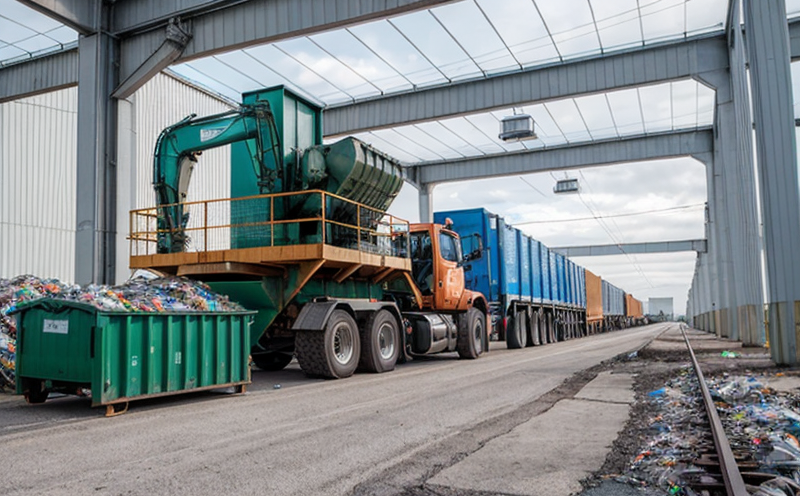ASTM D8174 Paper Recycling Process Testing
The ASTM D8174 standard is a critical tool used in industrial manufacturing and processing testing to evaluate the effectiveness of paper recycling processes. This service ensures that recycled paper meets specific quality standards, which are essential for maintaining product integrity and sustainability goals.
Recycling paper involves several stages where raw materials undergo various treatments before being transformed into new products. The ASTM D8174 process tests assesses the efficiency of these stages to ensure that the recycled fibers can be successfully used in manufacturing without compromising quality or performance.
The testing protocol focuses on key parameters such as fiber length, brightness, and strength, which are critical for determining whether the recycled paper meets the required specifications. These parameters play a crucial role in ensuring that the final product is of high quality and suitable for its intended use. By adhering to ASTM D8174 standards, manufacturers can ensure compliance with industry regulations and market demands.
The testing process typically involves several steps:
- Collection of samples from various stages of recycling
- Preparation of samples according to specified protocols
- Measurement of fiber length using specialized equipment
- Determination of brightness through colorimetry
- Evaluation of tensile strength and other mechanical properties
The results from these tests provide valuable insights into the efficiency of the recycling process. They help identify areas for improvement, ensuring that recycled paper can be used effectively in manufacturing without compromising on quality or performance.
Compliance with ASTM D8174 is not only essential for meeting regulatory requirements but also for maintaining a positive reputation among consumers and stakeholders who value sustainability. By adhering to these standards, manufacturers can demonstrate their commitment to environmental responsibility while ensuring product quality.
| Applied Standards |
|---|
| ASTM D8174 specifies the test methods for evaluating paper recycling processes by measuring key parameters such as fiber length, brightness, and strength. |
The application of ASTM D8174 in industrial manufacturing and processing testing helps to ensure that recycled paper meets the necessary quality standards. This is particularly important given the growing emphasis on sustainability and the circular economy within industries. By adhering to these standards, manufacturers can demonstrate their commitment to environmental responsibility while ensuring product quality.
Applied Standards
| Standard Number | Description |
|---|---|
| ASTM D8174-09(2013) | Test methods for evaluating paper recycling processes by measuring fiber length, brightness, and strength. |
The ASTM D8174 standard is widely used in the industry to ensure that recycled paper meets specific quality standards. This standard provides a set of test methods designed to evaluate various aspects of the paper recycling process, including fiber length, brightness, and tensile strength.
By adhering to these standards, manufacturers can ensure that their products meet regulatory requirements while also maintaining high-quality standards. The ASTM D8174 standard is particularly important for those in the industrial manufacturing sector who are committed to sustainability and environmental responsibility.
International Acceptance and Recognition
- The ASTM D8174 standard has been widely accepted by countries around the world, including the United States, Canada, and various European nations.
- Many international organizations have adopted this standard as a benchmark for evaluating paper recycling processes.
- The standard is recognized for its rigorous testing methods and reliable results.
The ASTM D8174 standard has been widely accepted by countries around the world, including the United States, Canada, and various European nations. Many international organizations have adopted this standard as a benchmark for evaluating paper recycling processes. The standard is recognized for its rigorous testing methods and reliable results.
By adhering to these standards, manufacturers can ensure that their products meet regulatory requirements while also maintaining high-quality standards. The ASTM D8174 standard is particularly important for those in the industrial manufacturing sector who are committed to sustainability and environmental responsibility.
Use Cases and Application Examples
The ASTM D8174 test methods can be applied in various scenarios within industrial manufacturing, such as:
- Evaluating the effectiveness of recycling processes in paper mills and converters.
- Determining whether recycled fibers are suitable for specific applications like printing papers or packaging materials.
- Identifying improvements needed in recycling processes to enhance product quality.
The test methods can also be used by R&D engineers to develop new products that incorporate recycled paper. By ensuring that the recycled paper meets specified standards, manufacturers can reduce costs and improve efficiency while maintaining high-quality standards.
For procurement teams, adherence to ASTM D8174 ensures that they are sourcing materials from suppliers who meet the necessary quality criteria. This helps to maintain consistent product quality across the supply chain.





